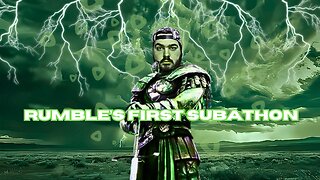Premium Only Content

This Is the Origin Story of the Middle East Conflict and Enemies of Israel Explained From the Bible
Check out our article on this topic: https://www.tomorrowsworld.org/magazines/2024/january-february/the-true-cause-of-trouble-in-the-middle-east
You can also get this free booklet: https://orders.tomorrowsworld.org/order/ME
Listen to this statement recorded in Ps 83:4, “Come, and let us cut them off from being a nation, that the name of Israel may be remembered no more.” While we’ve heard this sentiment from several nations in the Middle East, Psalm 83 is proclaiming a statement that will be made by a future coalition made up of the enemies of Israel and is part of a prophecy that was made about 3000 years ago.
In this video you’ll learn three key biblical ancestors of the peoples who make up the nations of the Middle East. You’ll see why there is so much animosity against Israel, and you’ll learn from the Bible how and when these ancient hatreds began.
And don't just believe us – but look up these verses in the Bible, and prove it for yourself as we examine some of the ancient influences of the Middle East.
Key #1, Ishmael is the father of the Arabs
It has been widely acknowledged for millennia, and still is, that the Arab people are the descendants of Ishmael, the son of Abraham. This is actually one point that Jews, Christians, and Muslims largely agree on.
In Genesis we see that Ishmael was born to Abraham of an Egyptian woman, named Hagar. (Gen 16:10–12)
God had promised a son to Abraham and Sarah in their old age (though, their original names were Abram and Sarai), but after some time had passed, and Sarah had not yet conceived, and they were only getting older, Sarah had Abraham have a child with her Egyptian servant, Hagar, so he could have a son through her. This is not what God intended.
This relationship caused a great deal of conflict between Sarah and Hagar, and eventually, Hagar fled from Sarah.
But God told her to return and submit herself under Sarah, and He told Hagar, “I will multiply your descendants exceedingly…” and, “You shall bear a son. You shall call his name Ishmael… He shall be a wild man; his hand shall be against every man, and every man’s hand against him. And he shall dwell in the presence of all his brethren.” (Gen 16:10–12)
Later, God told Abraham, “I have blessed him, and will make him fruitful, and will multiply him exceedingly… and I will make him a great nation. But My covenant I will establish with Isaac….” (Gen 17:20–21).
We should note here, before we continue: Isaac was the son that came through Sarah, and the covenant promised to him, and eventually Jacob and the Tribes of Israel, also included being multiplied exceedingly, in addition to far more. Including the ownership of the promised land, as well as, blessings of the fruit of the land, minerals, wealth, and becoming powerful world influencing nations at the end of the age.
Now, after Isaac had been weaned, “Sarah saw [Ishmael]… scoffing [or making fun of him],” so, Sarah and Abraham sent Hagar and Ishmael away. (Gen 21:9–14)
“So, God was with the lad; and he grew and dwelt in the wilderness, and became an archer… and his mother took a wife for him from the land of Egypt” (Gen 21:20–21).
So, we see from the biblical record that there was tension and resentment between Ishmael and Isaac, and between Hagar and Sarah. We also see that the descendants of Ishmael would:
“multiply exceedingly,”
become “a great nation,”
“Dwell in the presence of his brethren,”
Be a “wild man” who is “against every man, and every man against him.”
The general animosity we see in our world today from the Arab peoples of the Middle East and North Africa toward the Jews and other Israelite nations is rooted in the dynamics between Ishmael and Isaac. And it was prophesied that it would be so, which is proven true on a constant basis with what we see in our daily news regarding the Middle East.
Now, Key #2, The added influence of Esau against Jacob
When Isaac’s wife, Rebekah, was pregnant it says “the children struggled together within her… [and she asked God] ‘why am I like this?’... and the LORD said to her: ‘Two nations are in your womb, two peoples shall be separated from your body; one people shall be stronger than the other, and the older shall serve the younger.’” (Gen 25:22–23)
This was another prophecy that has held true.
The firstborn was Esau, and the second was Jacob (who later became Israel). As they grew, it says, “Esau [became] a skillful hunter, a man of the field; but Jacob was a mild man, dwelling in tents.” (Gen 25:27)
Genesis 25 shows Esau gave up his birthright blessings for a bowl of soup, having been deceived by his brother Jacob. (Gen 25:29–34)
Because he traded these blessings to be satisfied in the moment with a bowl of soup, Esau did not receive the primary blessing passed down from Abraham, and Isaac. Rather, Jacob received the primary blessing and birthright, and Esau received a lesser blessing. (Gen 27:30–40)
-
 1:40:22
1:40:22
Game On!
11 hours ago $2.08 earnedNFL Thursday Night Football Seahawks at Bears EXPERT Picks!
14.3K4 -
 LIVE
LIVE
xBuRnTx
1 hour agoWho's Ready for New Years!
292 watching -
 12:09
12:09
Tactical Advisor
13 hours agoSmith & Wesson Shield Plus Carry Comp
1.41K1 -
 4:35:25
4:35:25
Father Russell
6 hours agoDelta Force | Not A Woman? | Mad Martigan Time
38.5K1 -
 3:29:42
3:29:42
BrookieMonster
13 hours ago $43.52 earnedChristmas Stream: Marvel Rivals with CallmeSeags 🎄
164K29 -
 LIVE
LIVE
TheSaf3Hav3n
3 days ago| RUMBLES FIRST SUBATHON IS HERE!!! | DAY 4 |
583 watching -
 6:54
6:54
Dr. Nick Zyrowski
1 hour agoHIGH PROTEIN DIET Fixes Your Metabolism! - Weight Loss Not Required
8.01K5 -
 3:14:33
3:14:33
Joe Donuts Gaming
15 hours ago🟢 Live : Christmas is Here!! | Fortnite, Caroling, Light Tours and Donos !!
87.2K15 -
 6:02:38
6:02:38
CLUJ
14 hours agoCHRISTMAS EVENING HYPE!! LETS HAVE FUN GAMING!!
69.3K7 -
![I AM FINALLY BACK :: PUBG: BATTLEGROUNDS :: RUMBLE NOW HAS GIFTED SUBS!!! [Merry Christmas] {18+}](https://1a-1791.com/video/fwe1/22/s8/1/e/f/C/6/efC6v.0kob-small-I-AM-FINALLY-BACK-PUBG-BATT.jpg) 9:57:19
9:57:19
a12cat34dog
16 hours agoI AM FINALLY BACK :: PUBG: BATTLEGROUNDS :: RUMBLE NOW HAS GIFTED SUBS!!! [Merry Christmas] {18+}
61.7K8